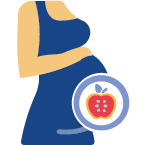

Citrus fruits and drinks may help you to cope with morning sickness. Apart from these, you may also have ginger, green vegetable soup, watermelon, etc. As these food and drinks are rich in Vitamin C and antioxidants that help in mood upliftment and replenish the electrolyte store.
To meet the elevated energy needs the prenatal diet should consist of 300+ Kcal extra than the normal diet. The protein and fat content should be more than normal to ensure the proper growth and development of the baby in the womb. Your plate should compose of colorful vegetables, pulses, whole grains, milk products, and seasonal fruit. You may consult with our diet expert to get customized prenatal diet plans.
Prenatal diet addresses nutrient recommendations during pregnancy. Nutrition management during pregnancy has a profound effect on the development of a baby. To maintain a healthy pregnancy, approximately 300 extra calories are needed each day. These calories should come from a balanced diet of protein, fruits, vegetables, and whole grains, etc.
The benefits of prenatal diet during pregnancy are:-
Poor eating habits and excess weight gain may increase the risk of gestational diabetes and pregnancy or birth complications. When the body has lower levels of insulin it leads to high blood sugar. Without treatment or management, high blood sugar levels may cause problems for a woman and her baby. By monitoring carbohydrate intake, eating low glycemic index foods, Eating more proteins, etc. can help in the management of gestational diabetes.
Each trimester comes with a unique set of challenges for pregnant women. For most normal-weight pregnant women, the right amount of calories is About 1,800 calories per day during the first trimester. About 2,200 calories per day during the second trimester. About 2,400 calories per day during the third trimester.
At the same time, the baby also develops in certain ways in each trimester. Therefore, we provide a wide range of diet plans to fulfill the needs.
At Momkicare we have customized diet plans, these diet plans are trimester-wise based on the requirement of the pregnant women. We also have a whole pregnancy plan that covers all the diet-related issues and management throughout the pregnancy. Regular follow-ups and WhatsApp connectivity with our health advisors and experts.
Obese or overweight can cause problems during pregnancy like:
Obesity during pregnancy also increases the risk of:
A healthy prenatal diet should compose of five major food groups including cereals, fruits and vegetables, pulses, fats and sugars, milk and its products. Half of your regular plate should be covered with cereals or millets. Rest half should have pulses and vegetables equally. Along with, one serving of milk or milk product and upto 20 grams of sugar and fat each will make your plate balanced as whole.
